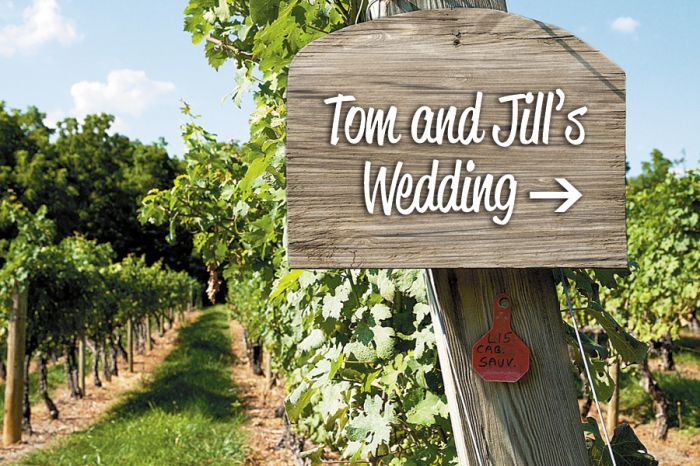Reaching the Limit

By Janet Eastman
Don’t print those wedding or party invitations just yet if you’re hoping to hold the event at a winery in the Oregon countryside. A bill limiting the number of non-wine events on farmland passed the state Senate in April and the House in mid-June.
The bill, SB 841, was initiated at the request of the Oregon Winegrowers Association (OWA) and farmers concerned that vineyards are being turned into event centers instead of tasting rooms where activities are focused on selling wine made from grapes grown on the property.
Wineries in the Willamette Valley would be required to obtain an over-the-counter administrative license for the first six events, and a stream-lined land-use permit authorizing the next 12 events — neighbors or nearby wineries could appeal the decision. Wineries wishing to conduct more than 18 events per year can do so under a conditional-use permit. Wineries outside the Willamette Valley would be authorized to conduct up to 18 events per year under the administrative license.
Proposed restrictions are tighter in the Willamette Valley, where the majority of the state’s 400 wineries are located. Most Northern Oregon wineries operate on smaller tracts than in Southern Oregon, leading to higher density and traffic.
The bill aims to balance the pull to protect farmland with wineries’ push to make money, says Michael Donovan of the OWA and Oregon Wine Board.
“Wineries need to have the right tools to be successful, but we should be farming grapes,” he says. “That’s why we were given the rights to operate a winery on [agricultural] land.”
Tasting rooms have no limits on the number of wine-related or wine-marketing activities, including wine tastings, wine club gatherings, winemaker meals, winery and vineyard tours, staff events and open houses, and business meetings with suppliers, distributors, wholesale customers and wine industry members.
Dan Marca, who opened his DANCIN Vineyards outside of Jacksonville a year ago, says the bill does not impact his operation.
“Our events are not an integral part of our business,” he says. “We are all about showcasing the wines that we produce in a unique, relaxed setting among the vines, as well as sharing the beauty and diversity of the Rogue Valley growing region.”
He declined a request from a wine-club member to rent his faculty for a wedding with 175 guests.
“That’s not what we do,” says Marca.
Scott Steingraber, the owner of Kriselle Cellars who opened a tasting room last year in White City, says he is torn about the bill. He approved the legislation as a member of the Southern Oregon Winery Association.
“I believe the OWA did a very good job in determining this current position,” he says. “But as a business owner, I do not believe it is in the best interest of the state or the wineries in Southern Oregon to reduce and limit private events.” Steingraber says most of the state’s wineries are small businesses with narrow profit margins and holding private events adds to the bottom line.
“These provide additional tax revenues and create jobs that are important to our economy,” he says. “By limiting the number of events, the proposed law will take away a bit of the ability for small wineries to continue to contribute to a healthy wine industry.”
At Kriselle Cellars, Steingraber says the focus is on sales and promotion of wine. But he also receives requests from customers, neighbors and colleagues to hold private receptions, retirement parties and business meetings.
“Some of our customers will walk away disappointed due to the additional regulation,” he says.
At the new Belle Fiore Estate & Winery in Ashland, a 19,000-square-foot chateau was built to be used as a private residence and public space for wine events and weddings. Below the chateau is a 20,000-square-foot winery with a ground-floor tasting room and upstairs ballroom.
According to the website,www.bellefiorewine.com, the 52-acre property off Dead Indian Memorial Road can accommodate wedding parties and private events for 200 people. The law allows for local governments to approve events beyond the 18 permitted.
Steingraber hopes Jackson County officials are prepared for additional requests for permitted use without placing burdens on the wineries.
At a Rogue Valley Winegrowers Association meeting in January, Patrick Flannery of the year-old Dana Campbell Vineyards in Ashland heard that neighbor complaints to county officials could trigger an investigation into the number of non-wine events.
Flannery and his wife, Paula Brown, planted grapes in 2006 and opened a tasting room on their 32-acre property last year. Although they do not plan to have non-wine events or elaborate food service, he says, he and Brown have operated under the old rule of keeping neighbors happy.
“Now, we would have to fill out a form,” he says.
Janet Eastman is a reporter for the Mail Tribune in Medford. Story courtesy of the Mail Tribune.










